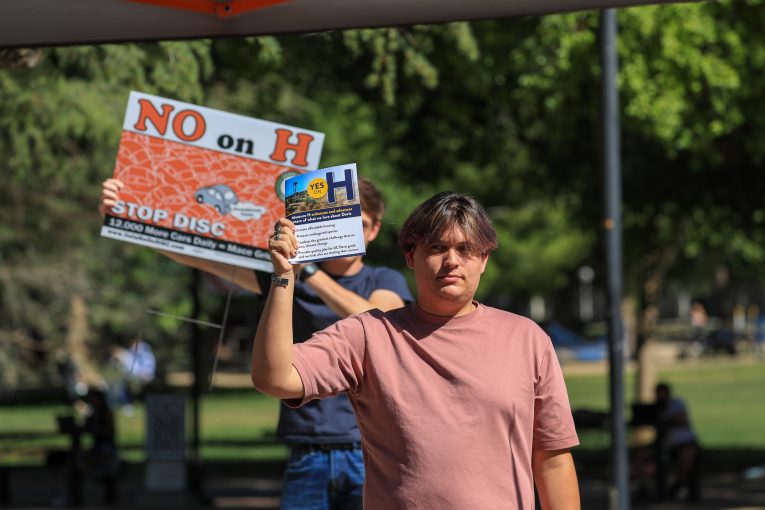
 By David M. Greenwald
By David M. Greenwald
Executive Editor
Davis, CA – Evan Cragin’s piece yesterday caused a stir. It should have. I was out there on Wednesday last week when it happened. I was standing a few feet away and my recorder picked up her heckle and my transcriber caught it clear as anything.
My immediate reaction was disgust. Want to protest a policy or measure you oppose—go for it. There was a small contingent of No on H people with signs at the rally last week. Most of the time, they jockeyed with the Yes on H contingent for position and visibility behind the speakers. No problem.
I start having a problem when you start heckling. It didn’t happen much though, the contingent was well behaved, even civil. Until the end when the young lady, right after Congressman Mike Thompson talks about Pettus Bridge and Selma and walking across with John Lewis, when he finishes she loudly shouts, “Okay, Boomer!”
The comment was dismissive and insulting, but the timing made it all the worse.
I talked with one of the No on H principals afterwards. She was apparently angry that neither Thompson nor his office had responded to her concerns questioning Thompson’s support of Measure H in light of what she saw as Dan Carson attempting to squash free  speech with his court action.
speech with his court action.
She thus became incensed that he was touting his commitment to voting rights in light of that.
She thought that was hypocritical and blurted out, “Okay, Boomer!” but realized later “that it was not the time or place for that.”
That about sums it up. Whether you agree or disagree with her beef, it wasn’t the time or place to make that point, especially in that manner.
As someone with a deep commitment to civil rights, I was moved by the Congressman’s comments and greatly bothered by her actions.
As Evan Cragin put it, “As a Political Science student, I was overjoyed when I transferred to UC Davis, despite knowing I would be one of very few Black students. I identified with Davis’ political culture; its passion for youth involvement, environmental sustainability, and, above all, civil, informed discourse. Every campaign and local representative I have worked with has prioritized civility, social, and racial justice, which is why I was so appalled when Congressman Mike Thompson came to Davis only to be disrespected.”
Cragin later wrote, “The No on H efforts are the same people suing nearly every housing project this decade, disproportionately forcing the working class to compete for severely limited housing. That coalition against new jobs and housing is unsurprisingly overwhelmingly White.”
I’m a bit surprised there wasn’t more blowback on the comments from this—probably before the new policy for commenting it might have generated more.
One person noted to me that the comment “suing nearly every housing project this decade” is false. If we are taking the statement literally, then they are right, nearly every housing project has not been sued.
But I didn’t view it as a literal statement. It was what I might call campaign hyperbole. Even so, five major projects since 2016 have in fact been sued—Nishi (twice), Lincoln40, Trackside, West Davis Active Adult. Given that there have been all sorts of other lawsuits (two hotels have been sued) and a number of threats of lawsuits, the point made here that this has burdened the working class attempting to compete for severely limited housing is accurate.
There is a cost to lawsuits—even when those lawsuits are understandable and justifiable, such as was the case with Trackside. Lord knows the local investors made a large quantity of mistakes in handling the neighborhood and the entitlement process.
It took seven years, however, to get through the process and beat back legal challenges. They had to go to the appellate court to get the Superior Court decision overturned and then it was not over until the Supreme Court declined to hear it earlier this spring.
You might have noticed the for-sale sign. The Sacramento Business Journal last week reported that the property, fully entitled, is now up for sale.
“After seven years of navigating risk and overcoming more challenges and delays than we thought possible, this exit strategy finally provides a financial return to our investors,” Kemble Pope told the Vanguard.
He added, “If not for the legal delays, we would have built the project and it would have been occupied for some time. Don’t forget, I started the Meridian Place process about a year after Trackside and it was delivered September 2018.”
Neighbors questioned whether the building was too large for the location—and they had a valid point. I questioned whether the intended clientele of empty nesters and/or professionals was the greatest need. But while those are valid concerns about the project, the basic fact is that it is yet another example of how difficult it is to build housing in Davis—and how expensive it has become.
I worry greatly about these forces creating a Davis that puts Davis out of reach of the traditional resident and makes it difficult for families to move into this vibrant college town.
I thought the remarks by Mayor Partida yesterday were very poignant.
“The loss of small town living or charm of Davis is probably the most honest reason people oppose growth,” she wrote. She noted that opposition to new housing “means we are willing to have people drive many miles for many minutes so that we save one or two minutes at a light. It means we are willing to squeeze the very community that makes our city what it is, namely the generations of families that know each other, out. It is easier to be willing to insist on these things when you add the virtue of preserving environment as part of the motive.”
The DiSC fight of course comes to an end this evening. As I wrote yesterday, I expect it to be very close. I would lean toward No winning, but wouldn’t be shocked if Yes won.
But after that, it becomes interesting again. The subcommittee of Gloria Partida and Dan Carson are the two seats up for election in November. Both have been unabashed supporters of housing and DiSC. Partida, in East Davis where the project resides, could be vulnerable and Carson, with his bullseye from his legal action, has earned the animosity of those in the slow growth community and perhaps beyond.
So stay tuned, things are only going to heat up more in Davis this year.







Cragin’s observation can be excused by the fact that local media coverage makes it appear that most projects have been sued.
This article focuses too much on what happened at Trackside. What about all of the other projects that have been delayed or foreclosed so far? Further, the two projects that have been approved under Measure J have been slow to start. In particular, Nishi has been delayed by the requirement that it cross the rail line to UCD rather than exit to Olive Drive in order to gain approval the second time around. That’s an indirect result of litigation through election.
This is David’s third bite of this particular “apple.” At least this time he has included some information about what the young woman was thinking/feeling just prior opening her mouth. We do have a sense of the frustration she felt, and the reasons behind that frustration.
However, the question I asked in the comments to yesterday’s article on this subject remains unanswered. So I will ask it again. What connection did Congressman Thompson see between the events on the Pettus Bridge and Measure H? The transcript David provided yesterday of Thompson’s remarks makes any connection to Measure H and/or DiSC elusive.
.
Conspicuously missing from this dialogue… and it is ironic that Evan Cragin is a student leader at UCD … is the point that UCD’s failure to provide on-campus housing for its ever increasing enrollment has burdened the working class attempting to compete for severely limited housing.
Edgar Wai’s May 18th comment below is once again on point..
.
It is powerfully elegant in its simplicity. Is there any reason to disagree with Edgar’s statement?
Of course you could also extend the host analogy, Davis is the host city of UCD, and as host, Davis has the responsibility of taking care of its invited guests. Analogies are always in the eye of the beholder.
If UCD were within the City Limits, I would agree with you David, but as you know full well, UCD isn’t in the City Limits. They are a neighbor rather than a guest.
Davis is a host city? Remind me what those city limit things are? Once again, UCD and the city of Davis have clearly decided that they wish to be independent of each other. So why continue this irrational notion of subservience to UCD in regards to students?
I’d also argue that Davis grew up and developed around UC Davis, so the connection between the two are symbiotic
It also grew up around Sacramento. Should we go out of our way to plan to house state workers?
As for a symbiotic relationship; two things can be independent of each other and still be in a symbiotic relationship. Both act in their own self interests. When one of the two entities is obliged to provide for the other….well, there’s another word for that kind of relationship.
Sacramento definitely should.
Well…yeah…the state capitol is in the middle of Sacramento. It’s almost like there’s some invisible boundary that defines where a city’s commitments should be dedicated. Some….I dunno for lack of a better word…limit…that defines where those city commitments are dedicated. Someone should invent this thing; a line that defines the city’s limits….what we should call it, I’ll leave it up to you.
City boundaries are just one measure. There’s also sphere of influence. There’s also the fact that the university address is: 1 Shields Ave, Davis, CA 95616
Nice try. You realize you’re talking to someone that has actually brought a project into a city’s boundaries through annexation (okay, my partners at the time did all the real work).
A sphere of influence is a plan for future probable boundary AND SERVICE AREA. UCD and shares and has service agreements with the city. Some services are separate (like Police and fire) and some are tied together….I’m guessing water, maybe sewer…etc.. What if the city decided to tell Yolo County…hey…you know what, we want to annex UCD. What would UCD say?….yeah….it would be something like: oh hll no! Or what if UCD said to the county we want the city to annex us. What would the city say? The two entities are separate. They want to be separate. Why are you forcing them to be together against their wills?
UC Davis is or can be autonomous for water and sewer services. They have their own wells. Originally UCD was going to be a partner in the surface water project, then backed out. I believe they are now customers of the project for some of their water supply. But they primarily draw from the deep-aquifer wells on campus (just as the city drew from deep-aquifer wells prior to the river water source, and reverts to that groundwater supply when water rights run out or, as now, when the state declares a “Shasta critical” condition). UCD has their own sewer treatment facility on the south side of their property.
UCD doesn’t really need the city of Davis for anything. Any cooperative planning would be because they want to, not because they need to. And they really don’t want to. UCD has been burned and won’t be likely to resume dialogue with the city about anything but the most mundane and inconsequential matters.
The attempt at merging the city and UCD fire departments failed.
David, let me help you out about spheres of influence (which I’m the one that has frequently brought up on this blog in the past).
Think of a sphere of influence like an engagement. The two parties are connected. They likely share things (apartment rent, travel expenses…). They have plans to get married but there are no actual legal bonds between the two of them. One has no obligation to the other (outside separate agreements like rental agreements..etc…).
I wonder if UCD continues to develop student housing and retail to go with it (as I and the mayor most recently has speculated) if UCD will move to incorporate itself into it’s own city (Aggieville?). Currently UCD operates in a weird in-between space as far as the County is likely concerned. Except for some small pockets of rural communities; the county wants cities to be the location of development, expansive services etc…. So I wonder if the county will want UCD to create their own city eventually or if UCD will want to.
Bottom line….IMO… the city of Davis had better ramp up a plan for student focused retail and entertainment near or adjacent to UCD (which would probably include student housing). Capture as much sales tax revenue as possible.
Sure. It isn’t true. They have no specific responsibility to do so. UCD students are customers of UC, not “invited guests.”
I was at the Yes on H GOTV rally and I was standing very close to David G. at the end of the Congressman’s speech. Though Greenwald’s report is accurate in detail, it omits important context. This was a rally for Yes on Measure H and people were holding yes on H signs behind the congressman as he spoke.
First, for background: I have deep appreciation of the voting rights movement. I have read Walking with the Wind, John Lewis’s autobiography and many other books about the subject, I have been to the Edmund Pettus bridge and I have been to the National Voting Rights Museum and Institute in Selma. I take the contributions of John Lewis, Hosea Williams all of the members of SNCC, the SCLC and the Selma voting rights movement very seriously. James Reeb was even murdered in Selma were he went to promote voting rights in Alabama and our country as a whole. I also studied nonviolence with the Reverend James Lawson, the same person who trained John Lewis in non-violence. I have interviewed and talked with people who were volunteers with SNCC in the voting rights movement. I know I can never fully understand what it was like to have been in Selma at that turning point with death a very real possibility for everyone involved, but I appreciate it deeply.
As the Congressman closed his presentation at the Yes on H GOTV rally and several people held yes on H signs behind him he made a plea to turn out the vote that included a description of spending time with John Lewis at the Edmund Pettus bridge as David has described.
I was surprised that the Congressman would use that example to try to turn out the vote for a freeway offramp industrial complex development on the edge of our town. Then again, Thompson appeared with Dan Carson who tried to use a lawsuit to stifle political speech so maybe I shouldn’t be so surprised. In my opinion, “OK Boomer” was a relatively mild response, though it is of course never polite to heckle.
Context matters.
Really? Contesting the validity some claims in a voter’s document? Really?
Okay…Xer!
Actually if you were representative of the Xers it would be more like:
As of the moment, that doesn’t appear to be the case: H is losing 60-40, with 10k votes counted. I don’t know how many votes are out there, but that’s a tough lead to overcome.
Pretty much over
Fingers crossed!
https://www.davisvanguard.org/wp-content/uploads/2022/06/Screen-Shot-2022-06-07-at-11.12.55-PM.png